Going the OTHER WAY
Anuradha Kodagoda
ďOne good thing about music is that when it hits you, you feel no
pain.Ē - Bob Marley.
With these words of Marley the first thing that came to my mind is
the extraordinary performance that really hit me a few months ago at the
Down Town Pulse Music Festival. A group of young artistes took the
audiences through a magical psychedelic journey.
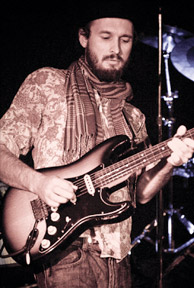 |
|
Tyson |
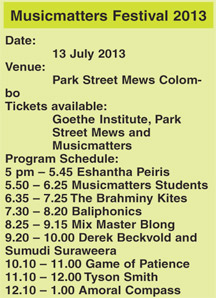 By the end of the night I was eager to know about this extraordinary
band and when I found that the key performers were from Musicmatters, my
doubts faded as they are well known for this type of music matters. By the end of the night I was eager to know about this extraordinary
band and when I found that the key performers were from Musicmatters, my
doubts faded as they are well known for this type of music matters.
Once again it is time to gear up for some psychedelic, rock music
with a Jazz touch as Musicmatters gets ready to host the second edition
of Musicmatters Festival 2013 on July 13, from 5.30 pm onwards at the
Park Street Mews Colombo.
This yearís Festival will be a combination of fancy Jazz, blues,
psychedelic rock, electronic dance music and exceptional Baliphonics Ė
Sri Lankan ritual folk music and many more.
Apart from Sri Lankan artistes, artistes from countries such as New
Zealand, Malaysia, Singapore, the US and Australia are to participate in
the festival.
Eshantha Peiris, Isuru Kumarasinghe and Tyson Smith from New Zealand
speak to Daily News on their festival experience.
Q: How did you get involved with Musicmatters?
Tyson: I met Sumudi when he was in New Zealand for his higher
studies. We learnt together at Christ Church Jazz School. Since then we
are in touch. A few months ago he contacted me and invited me to come to
Sri Lanka for a month, mainly to participate in the Musicmatters
Festival and also to do a few workshops for students of Musicmatters
institution. As thereís quite a good relationship now on with
Musicmatters and New Zealand musicians, this is a good opportunity for
me.
Q: Why is Musicmatters catering to alternative trends of
music?
Eshantha: I think itís the other way around. The musicians who
formed Musicmatters happened to be the musicians out of the main stream.
Therefore, itís obvious that when we are organizing a Festival, we play
music that we care about. The Musicmatters Festival and all the work
connected to Musicmatter fall into the alternative, experimental kind of
music.
Q: Your music is different - not familiar but unique. Why?
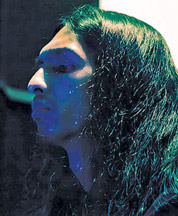 |
|
Isuru |
Eshantha: Anywhere in the world alternative trends are not
heard regularly. There are many reasons for that. These genres are not
radio-friendly, itís hard to tighten with commercial products. Itís not
the kind of music that is promoted by large record labels.. I think
thatís why our music is not mainstream and thatís why itís not familiar.
However, thatís not a value judgment. We produce this genre of music
because this is what we like.
And we find it meaningful.
Q: Whatís your idea about mainstream music in Sri Lanka? And
why Musicmatters doesnít want to fall into that category?
Isuru: There are two kinds of mainstream music trends that we
have identified. One is the Sinhala popular culture music and the other
one is Western-based pop culture. The Sinhala pop culture arose some
kind of an influence with Indian classical music but itís not really the
same.
However, western pop music directly comes from the Western base. At
some point we all fall into popular musical trends, one way or the
other. However, we think itís time to change and we need something
different without merely following what we have.
Obviously we canít do the same thing over and over again. Thatís the
main point that we are doing something different. Itís more than pop
music. But at some point we all play popular music somehow.
Eshantha: I think the mainstream music has a place in society.
The problem with mainstream music is, itís quite restrictive. There can
be good music but you are expected to play in a certain way, for certain
reasons. Sometimes that can be restrictive and we canít really make big
changes and it does not giving the opportunity to make the music that
you want.
Non musical trends have minimum commercial pressure and it gives us
more freedom to do what we really want to do. Though mainstream music is
popular and thereís a market, itís important to understand that itís not
the only entertainment mode.
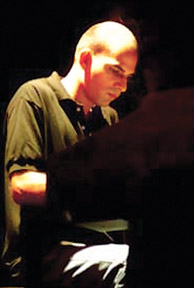 |
|
Eshantha |
Tyson: In New Zealand also the situation is same. If you play
only classical music on radio, then classical music would become the
mainstream music. Because thatís what people are forced to listen to.
People like what they know. Therefore, itís important in every country
to have people who really push the boundaries and challenge the
existences and open new avenues in every field of art and we are
consciously doing what we are doing.
Q: Is there an audience for this kind of alternative music?
And do you think your music is understood by the public?
Eshantha: If I answer the first question, we have gigs every
fortnight and have a regular audience who come to listen to the music.
If you ask whether the mainstream audience appreciates this kind of
music, probably yes. They are continuing to listen to popular music,
maybe because they donít have any other choice. For example at the last
Festival, there was a huge crowd and they appreciated our work. I donít
think they are all from the audience who have a better sense of
alternative music trends. Most of them were mainstream music listeners.
Can they understand our genre of music, is a tricky question. I donít
think people should really want to have a prior knowledge to understand
any kind of music.
Tyson: Most of the times people are used to or forced to
listen the same kind of music. In that sense, this type of music would
be slightly odd and sounds weird. But I think fundamentally if the music
is made sincerely, the energy behind it that can be conveyed through any
listener.
Q: What is improvising?
Eshantha: It is I some way a self-explanatory work, making the
music on the spot. Most of these groups make up music on the spot within
a certain musical language and within a certain musical frame-work.
Essentially, it is music created at the moment. So todayís version of
the same song, wonít sound the same tomorrow.
Isuru: According to the situation it can be changed. I mean in
life everyday doesnít look or feel the same, itís different. So itís the
same thing with music. Itís new and itís all about the moment.
Tyson: It all depends on the feeling at the moment. Ideally
what happens is we react to the surroundings and the valuable and
essential aspect of improvising being in the present rather than
re-creating a story that happens again and again as most of the
mainstream bands do. You are giving a room to present the moment, the
mood and the environment also has that. Therefore, the audience
witnesses a creation rather than a recreation. Obviously it is a
different extent altogether.
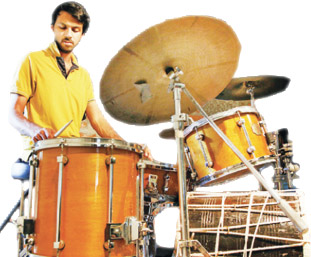 |
|
Sumudi |
Q. Though it is a vague question to ask, what does music mean
to you?
Tyson: Especially for me when it comes to improvising itís
expressing ultimately me. Itís obviously how you like to spend your
time. Some people like to write, some people like to cook and some like
to create music.
Music can be meditative and impressive at that moment. Sometimes
nothing matters when you play music. I think thatís a good way to live.
Eshantha: I think music is very much a part of being human .
It doesnít matter what kind of music you play, and for me itís all about
manipulating sound to connect with emotions, thoughts and the present
moment.
Isuru: Whatever the emotion or expression that it has, I think
it is a language trying to talk in a different way. In a sonic way.
Music is more like a language for me.
|





